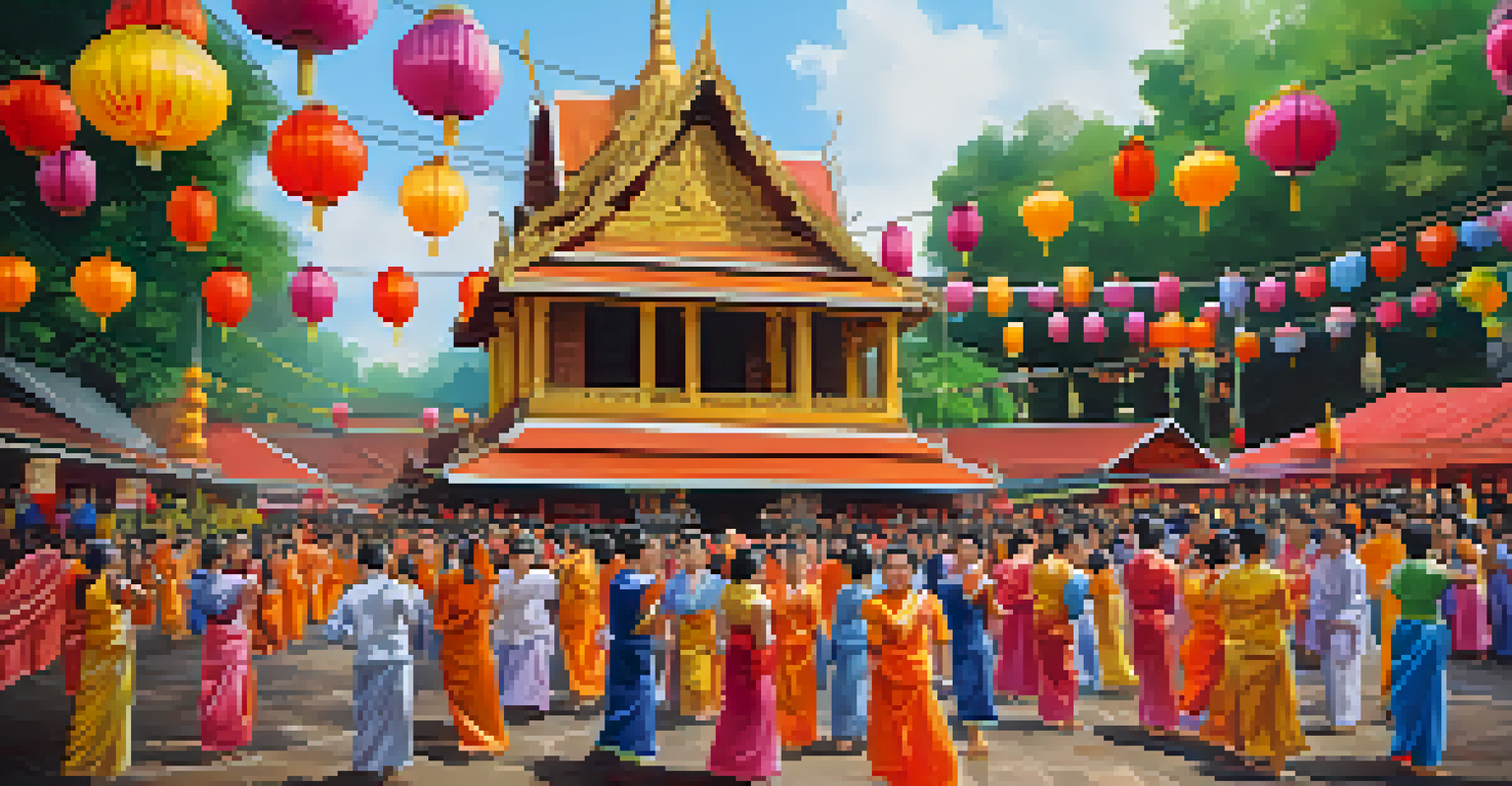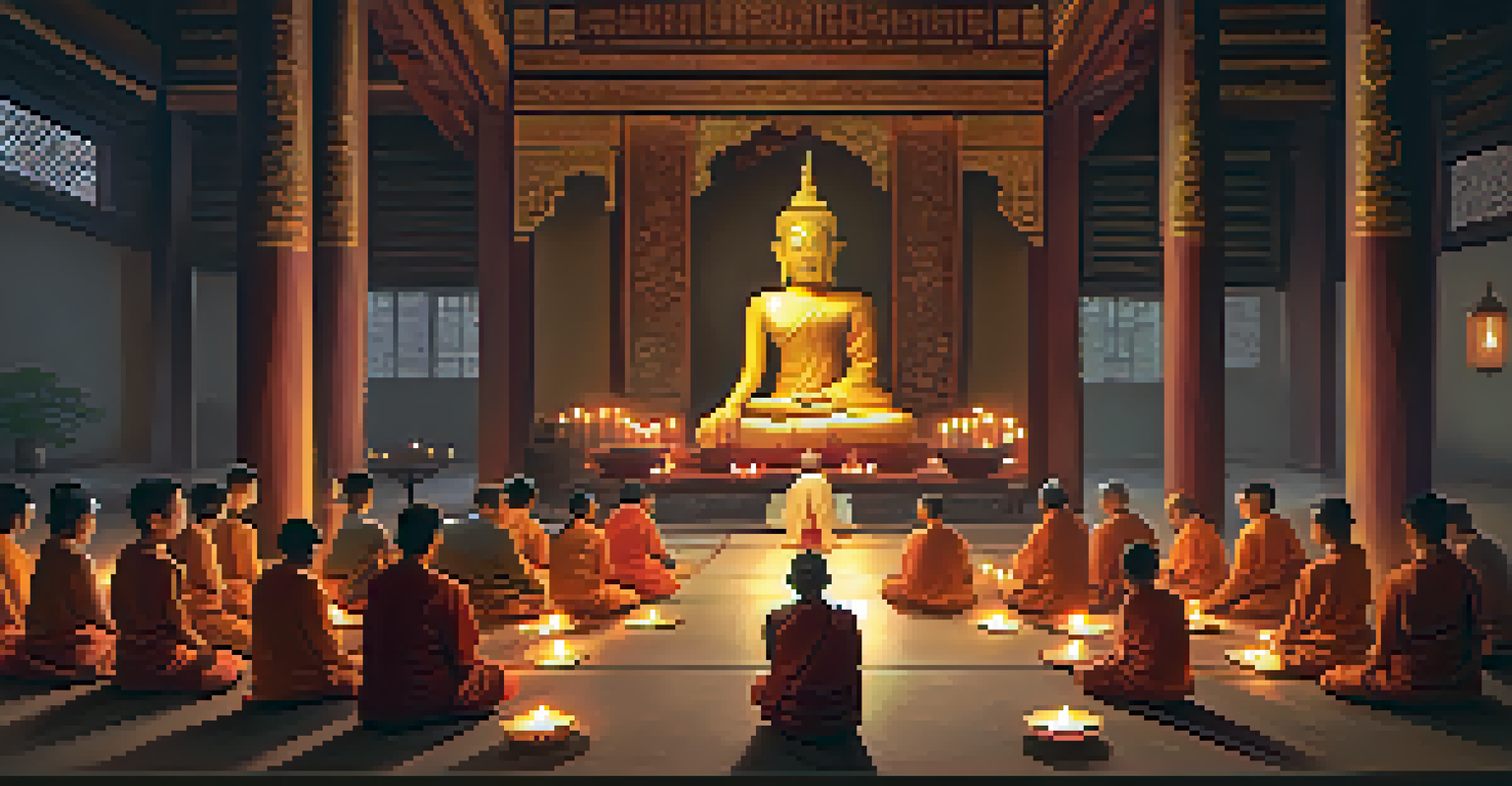The Spiritual Significance of Temple Visits in Thailand

Understanding the Role of Temples in Thai Culture
Temples, or 'wats,' are not just places of worship in Thailand; they are the heart of the community. Each temple serves as a gathering place for locals, fostering a strong sense of identity and belonging. The intricate architecture and serene surroundings create a space for reflection and connection with spirituality.
The temple is a place where the community gathers, a place of peace and reflection.
In Thailand, temples symbolize both spiritual and cultural heritage, representing the blend of Buddhist practices with local traditions. Visitors often find that these sacred spaces encourage a deeper understanding of Thai values, such as respect and compassion. This cultural immersion is a vital part of the temple experience.
Moreover, temples often serve as educational hubs, teaching visitors about Buddhism and Thai history. By participating in rituals and observing daily practices, one can gain insights into the shared beliefs that bind Thai society together. Thus, a visit to a temple is more than just a sightseeing trip; it's an opportunity for personal growth.
The Rituals and Practices at Thai Temples
Visiting a temple in Thailand often involves engaging in various rituals that hold deep spiritual significance. From lighting incense to making merit through donations, these practices help cultivate mindfulness and gratitude. Each act is a reminder of the interconnectedness of life and the importance of giving back.

One of the most common rituals is the offering of food or flowers to the monks. This act of generosity not only supports the monastic community but also fosters a sense of humility and respect for those who dedicate their lives to spiritual pursuits. It's a beautiful way to connect with the essence of Buddhism.
Temples as Community Hubs
Temples in Thailand serve as vital centers for community engagement, fostering connections among locals and visitors while promoting cultural exchange.
Additionally, many temples host meditation sessions, allowing visitors to find inner peace and clarity. These guided practices help individuals tap into their spiritual selves, promoting mental well-being and emotional balance. By participating in these rituals, visitors can leave the temple feeling rejuvenated and inspired.
The Influence of Nature in Temple Design
Thai temples are often designed to harmonize with their natural surroundings, reflecting a deep respect for nature. This architectural philosophy creates serene environments that invite contemplation and spiritual connection. The lush gardens and tranquil ponds complement the vibrant colors and intricate details of the temple structures.
In the heart of every community, there lies a sanctuary that nurtures the spirit and inspires the soul.
The inclusion of natural elements, such as trees and water, symbolizes purity and the cycle of life. For many visitors, this connection to nature enhances their spiritual experience, fostering a sense of peace and tranquility. It's as if the temple becomes a sanctuary where one can escape the chaos of daily life.
Moreover, the presence of nature in temple visits reminds us of our responsibility to protect the environment. As we engage with these sacred spaces, we can reflect on our own relationship with nature and consider how our actions impact the world around us. This awareness can lead to a more mindful approach to both spirituality and environmental stewardship.
The Significance of Festivals and Celebrations
Temple visits during festivals are a vibrant aspect of Thai culture, imbued with spiritual significance. Events like Loy Krathong and Songkran attract thousands, transforming temples into lively hubs of celebration. These occasions provide a unique opportunity to witness traditional rituals and community bonding.
During these festivals, the atmosphere is filled with joy, music, and colorful decorations, creating a sense of unity among participants. Engaging in these celebrations allows visitors to experience the rich tapestry of Thai spirituality and culture firsthand. It's a chance to step into a world where faith and festivity intertwine.
Rituals Promote Mindfulness
Engaging in rituals at Thai temples, such as making merit and meditation, helps visitors cultivate mindfulness, gratitude, and a deeper spiritual connection.
Moreover, participating in these festivities can deepen one's understanding of Buddhist teachings. Observing how spiritual practices are interwoven with daily life during these events can be enlightening. It shows that spirituality in Thailand is not confined to solemnity; it thrives in joyous expressions of faith.
The Impact of Temple Visits on Personal Growth
For many, visiting a temple in Thailand is a transformative experience that fosters personal growth. The peaceful ambiance encourages self-reflection, allowing individuals to reassess their life choices and spiritual beliefs. This introspection can lead to profound insights and a greater sense of purpose.
Additionally, engaging with monks and practitioners provides valuable lessons in compassion and mindfulness. Their dedication to spiritual practice serves as an inspiration for visitors, motivating them to integrate these principles into their own lives. The wisdom shared in these sacred spaces can resonate long after the visit.
Furthermore, the experience of making merit through good deeds during temple visits instills a sense of responsibility towards others. This practice reinforces the idea that personal growth is intertwined with community well-being. Ultimately, each visit can be a stepping stone toward a more fulfilled and conscious life.
Connecting with Local Communities through Temples
Temples in Thailand serve as vital community centers, fostering connections among locals and visitors alike. They provide a space for cultural exchange, where travelers can learn about Thai customs and traditions. This interaction enriches the experience, making it more meaningful and memorable.
Participating in local temple activities, such as volunteer work or communal meals, allows visitors to engage with the community on a deeper level. These shared experiences cultivate a sense of belonging and mutual respect, bridging cultural gaps and fostering understanding. It's a reminder that spirituality transcends borders.
Personal Growth Through Reflection
Visiting temples encourages self-reflection and personal growth, allowing individuals to explore their beliefs and gain insights into their life's purpose.
Additionally, temple visits can spark friendships that last beyond the trip. The bonds formed over shared experiences often lead to enriching conversations and ongoing connections. By immersing oneself in the local culture, you not only gain insight into Thai spirituality but also create lasting memories.
The Journey of Self-Discovery Through Temple Visits
Visiting temples can be a profound journey of self-discovery, prompting individuals to explore their beliefs and values. The serene environment encourages introspection, inviting visitors to reflect on their life's purpose and aspirations. This journey often leads to a deeper understanding of oneself and one's place in the world.
Many people find that the teachings of Buddhism resonate with their personal experiences, providing guidance and clarity. The emphasis on mindfulness, compassion, and interconnectedness encourages a shift in perspective, prompting individuals to live more intentionally. This transformation can be life-changing.

As visitors leave the temple, they often carry with them a renewed sense of hope and direction. The insights gained during their visit can inspire changes in behavior and thought patterns, leading to a more fulfilling life. Ultimately, temple visits offer a unique opportunity for personal evolution and spiritual awakening.